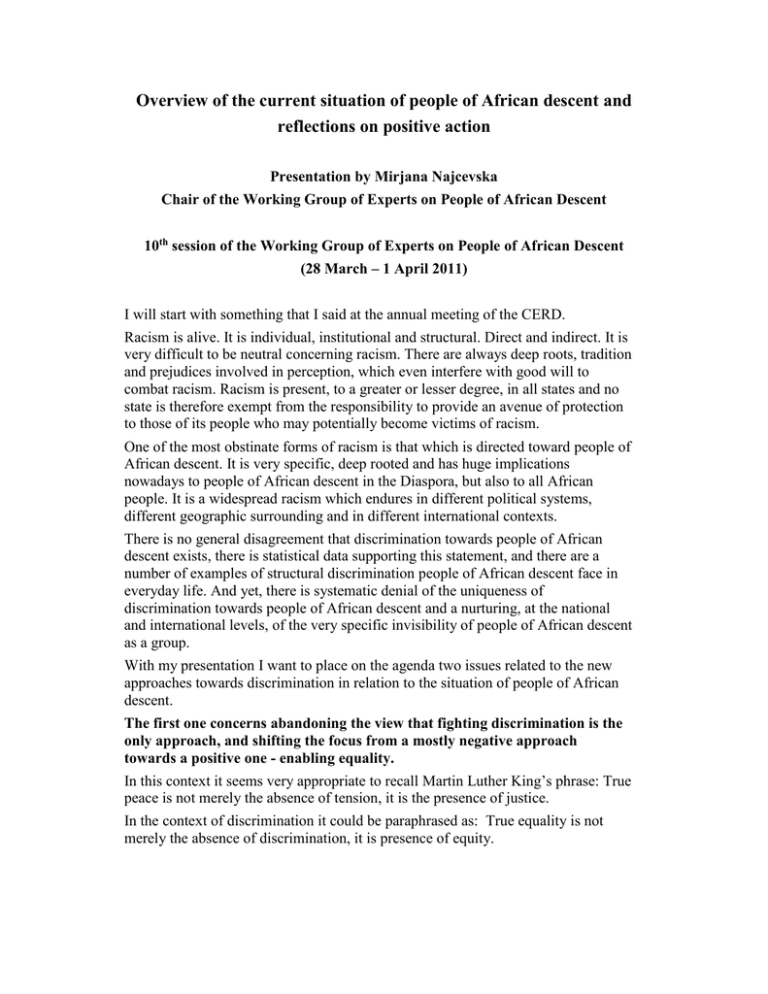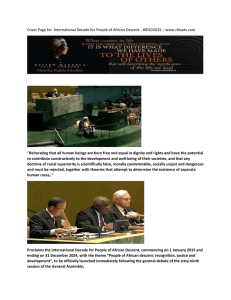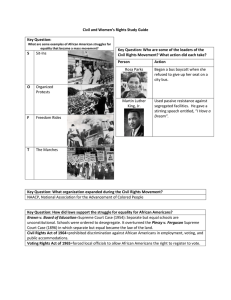Overview of the current situation of people of African descent... reflections on positive action
advertisement

Overview of the current situation of people of African descent and reflections on positive action Presentation by Mirjana Najcevska Chair of the Working Group of Experts on People of African Descent 10th session of the Working Group of Experts on People of African Descent (28 March – 1 April 2011) I will start with something that I said at the annual meeting of the CERD. Racism is alive. It is individual, institutional and structural. Direct and indirect. It is very difficult to be neutral concerning racism. There are always deep roots, tradition and prejudices involved in perception, which even interfere with good will to combat racism. Racism is present, to a greater or lesser degree, in all states and no state is therefore exempt from the responsibility to provide an avenue of protection to those of its people who may potentially become victims of racism. One of the most obstinate forms of racism is that which is directed toward people of African descent. It is very specific, deep rooted and has huge implications nowadays to people of African descent in the Diaspora, but also to all African people. It is a widespread racism which endures in different political systems, different geographic surrounding and in different international contexts. There is no general disagreement that discrimination towards people of African descent exists, there is statistical data supporting this statement, and there are a number of examples of structural discrimination people of African descent face in everyday life. And yet, there is systematic denial of the uniqueness of discrimination towards people of African descent and a nurturing, at the national and international levels, of the very specific invisibility of people of African descent as a group. With my presentation I want to place on the agenda two issues related to the new approaches towards discrimination in relation to the situation of people of African descent. The first one concerns abandoning the view that fighting discrimination is the only approach, and shifting the focus from a mostly negative approach towards a positive one - enabling equality. In this context it seems very appropriate to recall Martin Luther King’s phrase: True peace is not merely the absence of tension, it is the presence of justice. In the context of discrimination it could be paraphrased as: True equality is not merely the absence of discrimination, it is presence of equity. In other words, we are speaking of a one-faced coin. This coin needs another face. The front one is - equality; the back one is - non-discrimination. A much more positive and value-laden concept is the positive concept of equal treatment. Thus, for example, it is not sufficient for the achievement of equality simply to require the same conditions for all people, whether male or female, black or white; this is because in practice some sections of the community have been historically so disadvantaged as to be unable to compete in the race in the first place. In addition, it is inappropriate to ignore the fact that cumulative disadvantage makes it difficult for members of the disadvantaged group ever to attain the threshold of equal qualifications or merit as the dominant group. Here we can speak about inequality traps people of African descent are caught in. Furthermore, the fight against discrimination usually relies upon individual action (through litigation), to vindicate the protected rights. That, as a rule, does not provide either the support or the subsequent legal protection offered by a collectivist or group-based remedy. In addition, the victims may never actually achieve legal redress, since there may never emerge a particular ‘wrong-doer’ whose actions can be challenged; many manifestations of disadvantage result from an agglomeration of factors and circumstances for which no person or body may be legally responsible. The positive approach is far more systematic and oriented towards sustainability. It usually means an active role for the state (government). To make equality effective we should recognize the importance and role of proactive measures. An approach based on equality instead of non-discrimination is important for people of African descent. This approach allows us to address structural discrimination, and deep rooted as well as wide spread stereotypes and prejudices against people of African descent. Also, it creates a responsibility for governments to build institutions and developed politics which will prevent discrimination instead of just punishing it. It means a proactive role for the government to generate a general atmosphere of recognition of the sources and conditions of discrimination of specific groups such as people of African descent and the development of specific tools to enable equal enjoyment of rights and freedoms. So, one of the important tools in making equality effective is proactive measures. I do think that the positive measures and positive actions could facilitate equality. In my presentation I will use the typology of affirmative action used by Sanclemente Téllez, who identified three different approaches to affirmative action (compensatory, corrective and redistributive) which afford a better understanding of the different types of affirmative action, areas of implementation, and the instruments utilized in each case. The situation of people of African descent requires the use of all three methods: compensatory, corrective and redistributive. 1. A compensatory approach, mainly intended to remedy harm caused in the past, should address the consequences of the slavery history of people of African descent. Having in mind that some of the consequences are linked with very material issues such as property and the present situation of poverty, some of them are much more tied to the perception of people of African descent and their marginalization on the basis of race. These perceptions are affecting both people of African descent in the diaspora as well as those who are inhabitants of the countries on the African continent. 2. Corrective actions which are primarily utilized to ensure the end of discriminatory practices should address stereotypes and prejudices based on race. They should cover activities related to changing negative perceptions toward people of African descent, and be implemented through education, research, and media. An important part of these actions is recognition of the role of people of African descent in development on the national and international levels as well as respect for their specific culture as part of the national cultures in different countries. Effective corrective actions are long-lasting and usually they imply strong political will for change. 3. The objective of redistributive measures is principally to put an end to the unequal distribution of opportunity. It means the equal enjoyment of basic human rights and equal opportunities for people of African descent in comparison with others (especially white people) as well as tackling equity traps that people of African descent are caught in in relation to poverty, education, housing, health, and decision-making processes. Once we recognize the need for positive action, we can open a discussion on different mechanisms that could be used to achieve desirable aims. We can speak about the use of quotas as percentages imposed by law and which are easy to be used but which are, at the same time, too visible to be easily accepted by others. The term positive discrimination or reverse discrimination is mainly linked to quotas and they generate opposition, which claims that the constitutional right to equality under the law is being violated. Or, we can speak about soft instruments (preferential selection, targeting, specific programs) which are much more easily accepted. These instruments are less questioned because they do not exclude majorities automatically as in the case of quotas. One very interesting instrument is targeting. In its broadest sense, targeting means channeling public resources or subsidies toward specific population groups to achieve certain policy objectives. However, these soft instruments are potentially so universal that they may not address the specific needs and interests of people of African descent in such a way as to bring meaningful change to their situation. However, for all these activities there is one precondition. That is the visibility of people of African descent as a specific group with particular needs. One of the main characteristics of "old discrimination in new clothing" is the invisibility of people of African descent. The new manifestations of discrimination against people of African descent are closely connected with their invisibility as a group. First, invisibility exists as a result of insufficient statistical data on people of African descent (for example, as in many European countries where people of African descent are not specifically identified in national statistics). Second, a significant number of international mechanisms treat discrimination based on ethnicity or belonging to a minority group and most governments have ratified international human rights treaties that protect ethnic minorities. However, Afro-descendants, still need to “demonstrate” that they are a “minority” to gain special human rights benefits. Third, there is invisibility because of a general approach to combating discrimination without a specified approach relating to people of African descent. In the absence of a specialized human rights protection regime for Afrodescendants, the implementation of positive action instruments is questionable. So far, in many states proactive measures and affirmative action are linked mainly to indigenous people, while most people of African descent have been historically excluded from benefiting from these laws. It is not surprising that the development of equality legislation and non-discrimination measures is not affecting people of African descent to the same degreee as it is affecting other vulnerable groups. As positive action and positive measures are largely promoted and already used in many EU countries, I suggest that some of the experiences and expertise be transposed to the case of people of African descent. I will recall some of the recommendations concerning positive action measures given in the study “Benefits of positive action” developed by FRA in 2008: 1. Whatever the legal base, positive action is possible and feasible and can be made to work; 2. Positive action cannot work as a unilateral strategy; 3. A thorough assessment of the needs of all concerned should be done and then, jointly and clearly, define the aims to be reached; 4. Small business can be an important partner in positive action but the individual small business enterprises do not have the capacity to initiate it; 5. Positive action can be initiated by public authorities, and often depends on the ability of public authorities to form regional or national pacts; 6. Positive action is not charity. It benefits the society as a whole as much as the minorities that are targeted; In conclusion, on this occasion I want to repeat what I already mentioned several times: I am a proponent of positive action. The implementation of positive action, even in its current form, and in spite of the very unsystematic manner in which it is carried out, has shown encouraging results in the fields of education, housing, health, culture and decision making processes. Therefore, it logically follows that the next step is, and has to be, a systematic approach in the promotion and implementation of positive action. International mechanisms should play a leading role in the promotion and enabling of positive action. The already existing positive developments of use of positive action in cases of indigenous people and ethnic minorities should be used in the case of people of African descent. This means recognition of people of African descent as a group that is exposed to a unique form of discrimination and identification of the need for specific measures designed and directed to address the specific inequity traps that people of African descent are caught in. And, once more, I want to draw your attention to the need for proclaiming a decade for people of African descent to address all these issues in a proper manner and with realistic chances for success.


